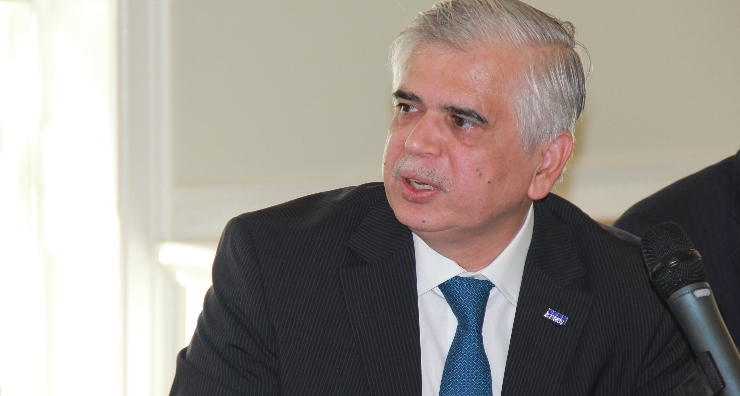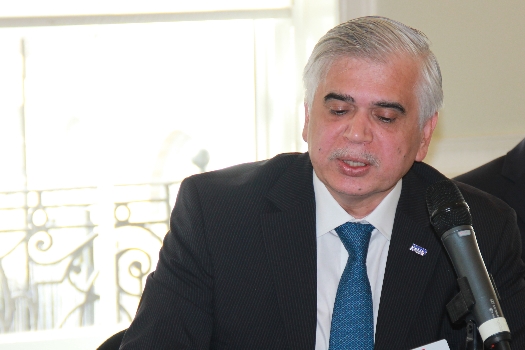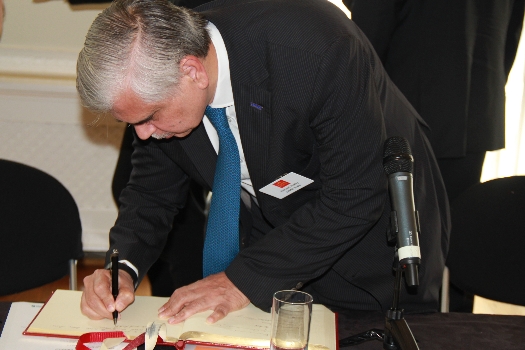Driving commercial and political engagement between Asia, the Middle East and Europe
Driving commercial and political engagement between Asia, the Middle East and Europe
Driving commercial and political engagement between Asia, the Middle East and Europe

KPMG India CEO Richard Rekhy has welcomed Narendra Modi government’s maiden budget as a positive step in the right direction.
The budget was unveiled by Finance Minister Arun Jaitley on 10 July.
In an exclusive interview with Asia House, Mr Rekhy said: “I think the budget has more hits than misses.”
Outlining the hits, he said the July 2014 budget addressed issues of economic growth in India and the fiscal deficit (which currently stands at 4.5 per cent of GDP) and it also looked at how to deal with governance and accountability, through the various schemes that Mr Modi announced.
The focus of this budget was on the manufacturing sector and infrastructure, which was positive, he said, because these were growth areas in India. He was also upbeat about the increase of FDI (foreign direct investment) in the defence and insurance sectors, and took that as a signal of plans to open up more FDI in the future.
One of the reasons why it was critical to get the Indian economy growing beyond five per cent was that 16 to 18 million Indians were entering the workforce every year, he explained.
‘India’s demographic dividend should not become a liability’
“Only if we have got the manufacturing sector can we find jobs for this many people. We need our young people to acquire the requisite skills to be part of the workforce. India’s demographic dividend should not become a liability,” Mr Rekhy said.
Analysts say that in order to create 15 to 20 million new jobs each year, the Indian economy needs to expand by at least eight per cent every year. But the slowdown in manufacturing has dragged the whole economy down.
Indian GDP growth for the financial year 2013-2014 was 4.7 per cent, the second consecutive year the economy has expanded by less than five per cent.
Another announcement in the budget was that tax holidays for power projects were to be extended, which Mr Rekhy described as great news for the energy sector. He also pointed out that a special allowance had been introduced to encourage capital formation in the manufacturing sector.
The NDA government announced various other measures to boost the manufacturing sector. For example, Mr Modi said he would consider Special Economic Zones (geographical regions in India with more liberal laws and tax exemptions to encourage businesses to set up and trade) again, he spoke about allocating funds towards infrastructure and roads, and making it easier to do business generally. The budget included significant allocations for national highways, rural roads, 16 ports, as well as plans for new airports in tier II and III (smaller) cities and the development of 100 smart cities, Mr Rekhy added.
“Acquiring land under The Right to Fair Compensation and Transparency in Land Acquisition, Rehabilitation and Resettlement Act, 2013 (which replaced the Land Acquisition Act, 1894), which came into force in January 2014, is now very difficult,” Mr Rekhy explained. “Most people that want to do business in India need land and Modi said he will reassess this Act.”
The Act stipulates stricter regulations for land acquisition for infrastructure projects and projects for public purpose and defines the compensation that must be given to displaced people and landowners.
Mr Rekhy said that KPMG in India was also working on a number of recommendations regarding amending the Right to Fair Compensation and Transparency in Land Acquisition, Rehabilitation and Resettlement Act, 2013 to make it easier to do business in India.

KPMG India CEO Richard Rekhy
“We are working with the Confederation of Indian Industry (CII) on a number of issues and are giving the Indian Government recommendations,” he said.
“Banks can now lend for infrastructure without flouting the Cash Reserve Ratio (CRR) limits. Normally there are limits on how much banks can lend,” he said. It is hoped this will encourage banks to give long term loans to the infrastructure sector, which in turn will boost manufacturing.
‘We hope to see more sectors benefiting from FDI’
Another highlight of the budget, according to Mr Rekhy, was the increase in how much FDI would now be allowed in the insurance and defence sectors. This has been raised to 49 per cent, up from 26 per cent previously.
Western companies may now consider investing in India’s defence and insurance sectors, although the law currently states that a 51 per cent stake still has to be held by the Indian partner. “Whether this will encourage them, only a matter of time will tell as it’s just been introduced,” he said.
“India is one of the biggest defence markets in the world. There are huge opportunities in the navy, army and air force as they all need a huge amount of modernisation,” Mr Rekhy pointed out.
“The defence sector attracts huge capital investment, so defence manufacturers are paying attention to movements in India. Several interested firms have set up office in India, including a number of British companies,” he said.
The opening up of FDI in the insurance sector in India was also encouraging, he said. “Less than three per cent of the Indian population is insured, so this will open up business opportunities.
“Healthcare is at a nascent stage in India. There is not enough insurance coverage and that can definitely grow,” he added.
Increase in FDI signals Modi may liberalise more sectors
“We hope to see more sectors benefiting from FDI infusion,” he continued.
The budget was also attractive to foreign institutional investors (FIIs) as it gave clarity that profits when selling shares would be taxed under capital gains tax, rather than business income tax (which is higher). Until now it has been unclear and many FIIs as a result chose not to be based in India and were facing litigation about the taxes.
‘What India needs is not FII but rather FDI’
“There is now a lot more FII money coming into India. But I am not sure if the FII money will help the growth of India. However it will be invested into the stock market and create buoyancy and bring liquidity into the market. What India needs is not FII but rather FDI which brings more long-term stability,” Mr Rekhy said.
Mr Rekhy said another favourable point of the budget, was the deepening of the corporate bond and currency derivatives markets by eliminating unnecessary restrictions and introducing new instruments to trade with.
Another highlight, in his view, were the various amendments in the Advance Pricing Agreements (or transfer pricing regulations), including a four-year roll back mechanism. These enable corporates to know in advance precisely which taxes they will have to pay on transactions, thus reducing litigation and offering more certainty. “Individuals can now take advantage of the amended advanced pricing agreement, as it is applicable for the last four years, even if one is in litigation,” he said.
Foreign companies are already raising funds from the Indian securities markets using Indian Depository Receipts. The Finance Minister proposed a ‘liberal and ambitious Bharat Depository Receipt (BhDR) scheme’ that would revamp the Indian Depository Receipt (IDR) scheme and boost funds from overseas. Standard Chartered PLC was the first and is the only global company to have filed for an issue of Indian Depository Receipts in India.
Converging to new accounting standards will put India on a par with international accounting systems
New accounting norms for corporate India will be mandatory from fiscal year 2016-2017. “This is good as until now Indian businesses have sometimes been discounted as people did not understand the accounts,” Mr Rekhy said.
Another positive of the budget was that it committed to implementing the Indian Financial Code, as drafted by the Financial Sector Legislative Reforms Commission, which lays out regulations for the finance sector and consumer protection. “This will give more confidence who want to consider business opportunities in the Indian market,” Mr Rekhy said.
Plans to increase India’s very low tax base
Finance Minister Arun Jaitley also announced his plans to increase the tax revenue base in India. “The government plans to use data analytics and expenditure patterns to understand who is not in the tax net and how to widen the existing tax base,” Mr Rekhy said. “For example they may look at diesel consumption or how much people spend and compare that to how many people file tax returns in a particular area or among a particular group.”
India has an extremely low tax base with less than three per cent of the 1.2 billion population paying income tax. Many others operate in the so-called shadow economy where money that is not accounted for is used.
In order that Indian public sector banks meet Basel III norms by 2018, an infusion of approximately USD40 billion is required. “Where this money is going to come from, Mr Arun Jaitley did not say. Whether they plan to create a bank holding company and start putting the money into that we don’t know, but 51 per cent in all public sector banks will be held by the government and the rest by the market. He has to do it in a phased manner. This opens up opportunities for people that want to invest in banks,” he added.
He said the rupee was expected to remain at about INR60 to INR63 to the USD (or INR100 to INR102 to GBP). “It has stabilised now and there is nothing in the budget that indicates the rupee should fluctuate. That is where I think it will land now and this is the new norm,” he said. “The Reserve Bank of India feels this might be the right valuation for the rupee as it has encouraged exports among other things,” he added.
Current account deficit is under control
He said the current account deficit was now under control. “It is the lowest ever because we have increased exports as a percentage of GDP,” he said.
The fiscal deficit is currently at 4.5 per cent and his target is to reduce it first to 4.1 per cent this financial year and then 3.5 per cent the next year and 3 per cent the following year (2016-2017). “He has not stated how he will do this, but broadly the mathematics adds up, with his plans for disinvestment and more money flowing into the banking system.”
There were a few misses in the budget, Mr Rekhy said. One of these was that a date for the implementation of The Goods and Services Tax (GST) was yet to be announced. This would be a single tax, similar to VAT on purchases of goods and services, to replace the current layers of state and national taxes imposed. Nor were any details mentioned of plans to introduce a direct income tax code.
Another miss was that the retrospective tax amendments to income tax laws were not repealed.
In 2012, the then UPA-led Indian government introduced retrospective amendments to income tax laws stating that foreign firms would be obliged to pay taxes on any overseas transaction involving an Indian asset dating back 50 years. Cutting subsidies was similarly not tackled.
“In my view, small doses are better than big reforms in a country like India, as it gives us time to absorb it,” Mr Rekhy said.
Six per cent growth anticipated in two years
“I don’t think we are going to see eight per cent growth soon. We can expect to see six per cent growth in two years and then eight per cent in four to five years,” Mr Rekhy said.
India’s next budget will be unveiled in February 2015. “The one point that people mistook about the budget is that that it is not the time that the government makes all the announcements,” Mr Rekhy said. More announcements will follow during the year, he explained.
‘This government is known for being good at execution and that is the key’
He said the biggest positive of the budget was that optimism was now back in India after a period of negativity and foreign investors were looking at the country again. “This government is known for being good at execution and that is the key,” he added.

KPMG India CEO Richard Rekhy signs the Asia House guest book
naomi.canton@asiahouse.co.uk
We carried an exclusive set of stories on the Indian Elections 2014. To read insights from the writers we commissioned click here.
KPMG India CEO Richard Rekhy and Standard Chartered Bank Asia CEO Jaspal Bindra gave a private briefing at Asia House for corporate members. To read about that click here.
To find out our private briefings and how else you can benefit from corporate membership click here or email Vivi Qi, Corporate Membership Manager, at Vivi.Qi@asiahouse.co.uk.
